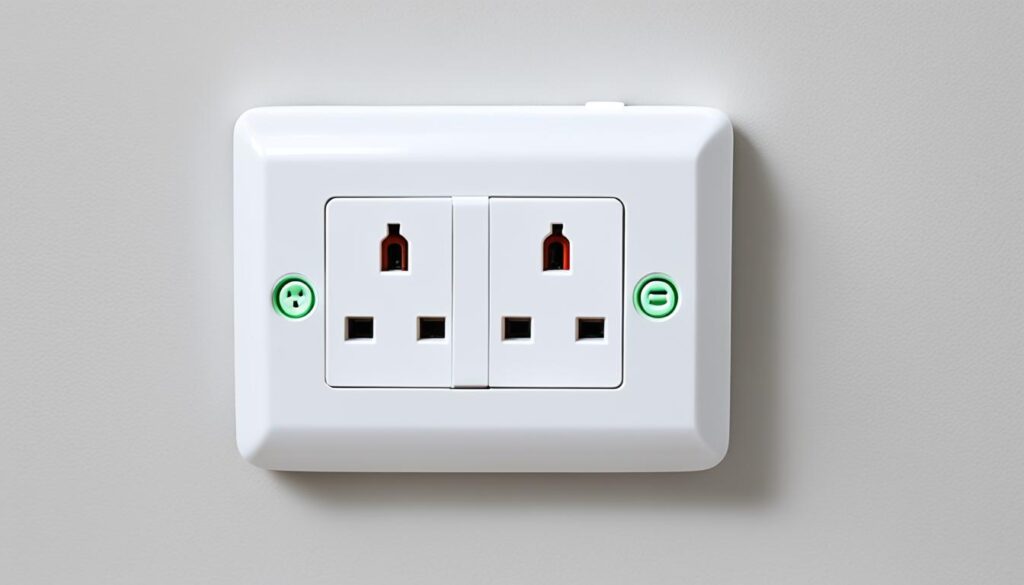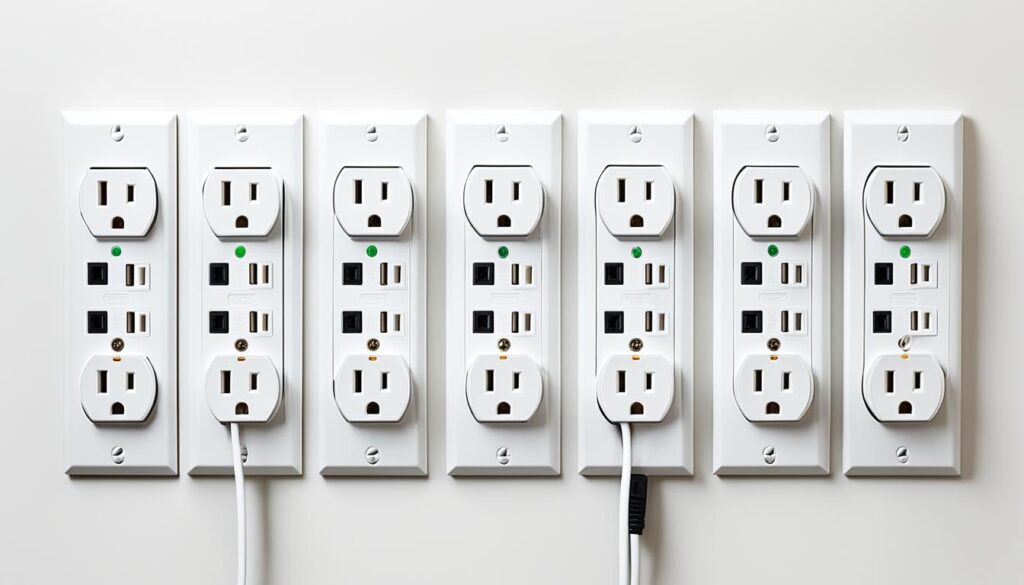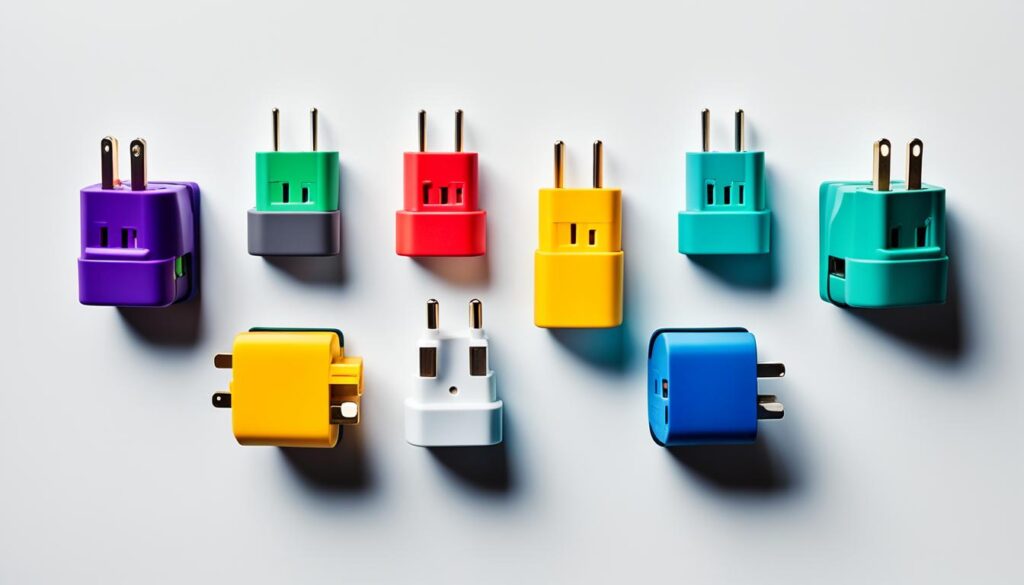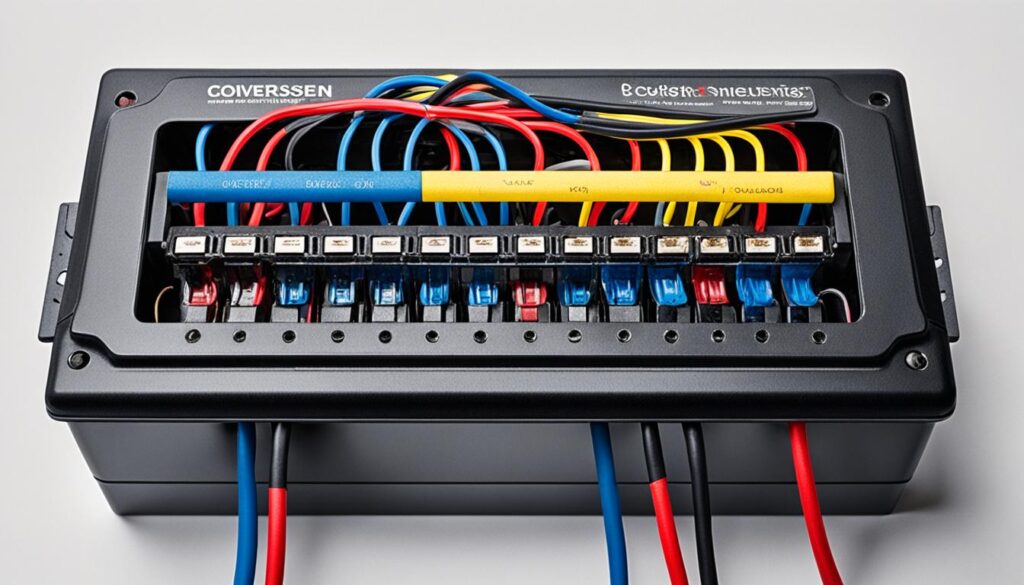As a homeowner or traveler in the United Kingdom, it is essential to have a good grasp of plug outlets, also known as electrical sockets or wall plugs. These outlets play a crucial role in powering our devices and appliances, making them an integral part of the British electrical system.
There are various types of plug outlets available, each with its own advantages and applications. USB mains sockets have gained popularity due to their ability to easily charge devices like mobile phones. Remote-control mains sockets offer convenience, allowing you to activate specific outlets with ease. Mains timer sockets allow you to set timers for specific periods of active usage.
When it comes to plug outlet safety, it’s important to take precautions. Always use outlet covers to protect against accidental contact with live wires. Proper installation of plug outlets is crucial, and if you need assistance, don’t hesitate to consult a professional. Regularly check outlets for signs of wear or damage, replacing them if necessary. Additionally, be mindful of overloading outlets to avoid electrical hazards.
If you’re considering upgrading your plug outlets, there are several options to enhance both functionality and aesthetics. USB mains sockets make charging devices more convenient, while remote-control or smart sockets offer automation and connectivity for a smarter home. Remember to follow proper installation procedures and seek professional help when needed.
For international travelers coming to the UK, plug adapters are a necessity. The United Kingdom uses type G plugs with three rectangular pins, and adapters allow you to use your appliances with UK electrical sockets. However, it’s important to note that these adapters only accommodate the physical connection and do not convert voltage or frequency. To ensure safe usage, always check the voltage and frequency compatibility of your appliances.
Lastly, if you need to use appliances with different voltage or frequency requirements, voltage converters or transformers become necessary. These devices ensure safe operation by adapting the electricity supply to the appliance’s needs. Dual voltage-rated appliances can work within the UK’s 230V supply voltage range without the need for converters or transformers. Single voltage-rated appliances will require the use of voltage transformers or converters.
In conclusion, understanding UK plug outlets is essential for a safe and efficient electrical experience. Whether you’re looking to upgrade your outlets, ensure safety, or prepare for international travel, following proper guidelines and seeking professional help will make your electrical endeavors seamless.
Key Takeaways:
- There are various types of plug outlets available, including USB mains sockets, remote-control mains sockets, and mains timer sockets.
- Outlet safety involves using outlet covers, proper installation, regular checks, and avoiding overloading.
- Upgrading plug outlets can enhance functionality and aesthetics, with options like USB mains sockets and remote-control or smart sockets.
- International travelers to the UK will need plug adapters to use their appliances with UK electrical sockets, but voltage and frequency compatibility must still be considered.
- Voltage converters or transformers are necessary when using appliances with different voltage or frequency requirements.
Types of UK Plug Outlets
In the UK, there are various types of plug outlets that cater to specific needs. Let’s explore some of these options:
1. USB Mains Sockets
USB mains sockets are becoming increasingly popular due to their convenience and versatility. These outlets allow for easy charging of devices such as mobile phones, tablets, and other electronic gadgets directly from the socket. With USB ports integrated into the outlet, you can eliminate the need for bulky adapters and free up valuable plug space. This is especially beneficial when multiple devices need to be charged simultaneously.
2. Remote-Control Mains Sockets
If you’re looking for added convenience and control, remote-control mains sockets are an excellent choice. These outlets come with a remote control that allows you to activate or deactivate specific sockets with a simple click of a button. This feature is particularly useful when you have hard-to-reach outlets or want to control the power supply to individual devices or appliances. With remote-control mains sockets, you can create a more automated and connected environment in your home.
3. Mains Timer Sockets
Mains timer sockets provide the flexibility to set timers for the duration you want the socket to be active. This feature is ideal for automating lighting, heating, or other electrical devices, allowing you to save energy and have greater control over your electrical consumption. With mains timer sockets, you can schedule specific times for the outlet to be active, ensuring that appliances or devices are only powered when needed. This is not only convenient but also promotes efficiency and cost savings.
| Plug Outlets | Key Features |
|---|---|
| USB Mains Sockets | Convenient USB charging |
| Remote-Control Mains Sockets | Individual power control |
| Mains Timer Sockets | Scheduled outlet activation |
As technology advances, plug outlets continue to evolve, offering enhanced functionalities and customized solutions to meet diverse electrical needs. Whether you require easy device charging, remote control access, or automated scheduling, there is a plug outlet available to suit your requirements.
Plug Outlet Safety Tips
When it comes to plug outlet safety, there are a few important tips to keep in mind. Protecting yourself and your loved ones from electrical hazards is crucial for a safe home environment. Follow these guidelines to ensure the utmost safety:
1. Use Outlet Covers
Always use outlet covers to prevent accidental contact with live wires. Outlet covers act as a barrier, safeguarding against potential shocks. Whether you have young children or pets at home, securely covering your plug outlets is essential for their well-being.
2. Proper Outlet Installation
Ensure that plug outlets are installed correctly to avoid any electrical mishaps. If you’re unsure about the installation process, it’s recommended to consult a professional electrician. They have the knowledge and expertise to handle the intricate wiring and ensure that all safety protocols are followed.
3. Regularly Inspect Outlets
Regular inspection of plug outlets is vital to identify any signs of damage or wear. Look for frayed wires, loose connections, or burn marks around the outlets. If you notice any issues, it’s crucial to replace them immediately to prevent potential hazards.
4. Avoid Overloading Outlets
Overloading plug outlets can lead to overheating, short circuits, and even fires. Make sure not to exceed the maximum load capacity of your outlets. Spread the usage of electrical devices across multiple outlets to distribute the load evenly. If you require additional outlets due to high power consumption, consider professional outlet installation to accommodate your needs safely.
By following these plug outlet safety tips, you can create a secure environment in your home and minimize the risk of electrical accidents. Prioritizing safety ensures peace of mind for you and your family.

Upgrading Plug Outlets
Upgrading your plug outlets is a great way to improve both the functionality and aesthetics of your electrical system. By replacing basic outlets with advanced options, you can enhance your everyday life and create a more convenient and efficient home environment.
USB Mains Sockets for Easy Device Charging
One popular option for upgrading your plug outlets is to install USB mains sockets. These innovative outlets have built-in USB ports that allow you to charge your devices directly without the need for bulky adapters or chargers. With USB mains sockets, you can easily charge your smartphones, tablets, and other USB-powered devices without occupying the main electrical socket. It’s a convenient and clutter-free solution for the modern household.
By incorporating USB mains sockets into your electrical system, you can create designated charging stations throughout your home or office. Whether it’s in the kitchen for your family’s smartphones or in your home office for your tablet and smartwatch, having USB mains sockets eliminates the need for multiple adapters and cables, making charging a breeze.
Remote-Control or Smart Sockets for Automation
If you’re looking to add a touch of automation and control to your electrical system, consider upgrading to remote-control or smart sockets. These sockets allow you to operate your electrical devices remotely, providing convenience and energy-saving benefits.
With remote-control sockets, you can easily turn on and off your appliances or devices from a distance with the press of a button. This feature comes in handy when you want to control hard-to-reach outlets or if you want to create a timer schedule for your devices.
Smart sockets take automation to the next level. These intelligent devices can be controlled through your smartphone or even voice-activated assistants like Amazon Alexa or Google Assistant. By connecting your smart sockets to a smart home hub, you can have complete control over your electrical devices from anywhere, anytime. From turning on the lights before you arrive home to scheduling your coffee machine to start brewing every morning, smart sockets offer endless possibilities for a more connected and convenient lifestyle.
When upgrading plug outlets, it is important to follow proper installation procedures. If you’re unsure about the installation process or want to ensure everything is done correctly, it’s always best to consult a professional electrician. They have the knowledge and expertise to handle the installation and ensure your upgraded outlets are safe and compliant with electrical regulations.

International Plug Adapters
Traveling to the UK from another country? Don’t forget to pack a plug adapter to ensure you can use your electrical appliances during your stay. The United Kingdom utilizes type G plugs, which feature three rectangular pins. These plug adapters simply allow you to plug your devices into the UK electrical sockets, facilitating their connectivity without the need for voltage or frequency conversion.
It is vital to check the voltage and frequency compatibility of your appliances to guarantee their safe usage in the UK. Failure to do so may result in potential damage to your devices or even electrical hazards. By being prepared with the right plug adapter, you can easily and safely connect your appliances, ensuring a comfortable stay in the UK.
Understanding Type G Plugs
Type G plugs are predominantly used in the United Kingdom and various other countries around the world. Their distinctive design features three pins, with the top pin acting as an earth connection. This plug type is versatile and can handle a higher electrical load, making it suitable for a wide range of electrical appliances and devices.
If your country does not use type G plugs, it is important to acquire a plug adapter specific to this plug type before your trip. This will enable you to adapt your electrical appliances to the UK plug outlets, ensuring seamless compatibility and hassle-free usage.
Voltage and Frequency Compatibility
While plug adapters allow you to physically connect your appliances to the UK electrical sockets, it is essential to note that they do not convert voltage or frequency. Different countries have varying electrical systems, with voltages ranging from 100V to 240V and frequencies of 50Hz or 60Hz.
Before plugging your appliances into a UK outlet, verify that they are compatible with the UK’s standard voltage of 230V and frequency of 50Hz. This information can typically be found on the appliance’s rating plate or within the user manual.
Attempting to use appliances with incompatible voltages or frequencies without appropriate voltage converters or transformers can lead to damage to both the appliance and the electrical system, posing a safety hazard. It is crucial to ensure proper compatibility to mitigate any risks and ensure the optimal performance of your devices.
Safe and Convenient Travel with Adapter
Adequate planning and preparation are key to an enjoyable trip to the UK. By acquiring the necessary plug adapters and verifying the voltage and frequency compatibility of your electrical appliances, you can eliminate any potential inconveniences or complications during your stay.
An international plug adapter is a small investment that goes a long way in ensuring your devices can seamlessly connect to the UK plug outlets. This allows you to stay connected, charge your devices, and enjoy all the conveniences offered by your electrical appliances without any hassle.

| Country | Voltage | Frequency |
|---|---|---|
| United Kingdom | 230V | 50Hz |
| United States | 120V | 60Hz |
| Canada | 120V | 60Hz |
| Australia | 230V | 50Hz |
| Germany | 230V | 50Hz |
Voltage Converters and Transformers
When it comes to using appliances with different voltage or frequency requirements, voltage converters and transformers play a crucial role. **Plug outlets** provide electricity supplies that can vary between 100V and 240V worldwide, and these variations can pose safety risks if not properly managed. By utilizing **voltage converters** or **transformers**, you can ensure the safe operation of your appliances while maintaining compatibility with the UK’s standard 230V supply voltage.
**Dual voltage rated appliances** are designed to work within a wide voltage range, including the UK’s 230V supply, without the need for converters or transformers. These appliances have the flexibility to be used in various countries with different electrical systems. However, it is important to verify the voltage compatibility of your appliances before assuming they are dual voltage rated.
If your appliances are **single voltage rated**, meaning they can only operate within a specific voltage range, you will need to rely on voltage transformers or converters. These devices convert the voltage of the UK’s electrical system to match the requirements of your appliances, ensuring safe and proper functionality.
Using voltage converters or transformers requires careful consideration. It’s essential to choose the appropriate device that can handle the power requirements of your appliances. Additionally, make sure to follow the manufacturer’s instructions when using these devices to maintain safety and prevent any electrical hazards.
When traveling internationally or using appliances from different countries, being aware of **voltage compatibility** is crucial. Without the appropriate converters or transformers, attempting to use appliances with incompatible voltage requirements can lead to damage, malfunctions, or even pose a risk of electrical shock.
By understanding the importance of voltage converters and transformers, you can ensure the safe operation of your appliances and protect both yourself and your electrical system.

Summary:
- Plug outlets provide varying electricity supplies worldwide.
- Voltage converters and transformers are crucial when using appliances with different voltage or frequency requirements.
- Dual voltage rated appliances can work within the UK’s 230V supply without the need for converters or transformers.
- Single voltage rated appliances require voltage transformers or converters for safe usage.
- Ensure to choose the appropriate voltage converter or transformer and follow the manufacturer’s instructions.
- Travelers should be aware of voltage compatibility to avoid electrical hazards.
Plug Outlet Considerations for Travelers
When traveling to the UK, it is important for tourists to consider the compatibility and requirements of their electrical appliances. To ensure a hassle-free experience, there are a few key factors to keep in mind.
Check Appliance Dual Voltage Capability
Before plugging in your devices, take a moment to examine the rating plate on each appliance. Look for indications that the appliance is capable of operating on dual voltage. Dual voltage appliances are designed to work seamlessly with different voltage systems, eliminating the need for converters or transformers. If your appliances have this feature, you can simply use a travel adaptor to plug them into UK plug outlets without any additional equipment.
Consider the Type of Travel Adaptor
When selecting a travel adaptor, it is essential to choose the right one for your specific needs. Some travel adaptors may not be suitable for appliances that require an earth connection. To ensure safety and proper functioning, use travel adaptors only with double-insulated equipment that does not rely on an earth connection. If your appliances require an earth connection, it is crucial to seek appropriate adaptors or consult with a professional.
Understand Requirements and Safety Measures
It is vital to familiarize yourself with the requirements and safety measures for using electrical appliances in the UK. Make sure you are aware of the voltage and frequency compatibility of your devices and ensure they are suitable for use in the UK’s electrical system. If you have any doubts or concerns, consulting an electrician or an expert in electrical appliances can provide valuable guidance and advice.
By considering these plug outlet factors and taking the necessary precautions, travelers can enjoy a seamless experience using their electrical appliances in the UK.
| Travel Adaptor Type | Compatibility | Features |
|---|---|---|
| Type A | Compatible with US, Canada, Mexico, and other countries using type A plugs. | Unearthed, two flat pins. |
| Type C | Compatible with Europe, Asia, and other countries using type C plugs. | Unearthed, two round pins. |
| Type G | Compatible with the United Kingdom, Ireland, and other countries using type G plugs. | Earthed, three rectangular pins. |
Conclusion
Understanding plug outlets is crucial for navigating the British electrical system. Whether you’re looking to upgrade your outlets or prepare for international travel, this comprehensive guide has provided you with the necessary information for a safe and efficient electrical experience in the UK.
By familiarizing yourself with the different types of plug outlets available, such as USB mains sockets and remote-control mains sockets, you can enhance the functionality and convenience of your electrical system. Prioritizing outlet safety by using outlet covers, ensuring proper installation, and avoiding overloading outlets can help prevent electrical hazards.
For travelers, knowing the importance of using travel adaptors and understanding the compatibility of your electrical appliances is essential. Check the rating plate of your appliances for dual voltage capability and use them with suitable adaptors to ensure safe usage in the UK.
Remember, when it comes to plug outlets, it’s always best to follow proper guidelines and seek professional help when needed. By doing so, you can ensure a seamless and hassle-free experience with your electrical sockets, regardless of whether you’re upgrading your outlets or traveling internationally.

